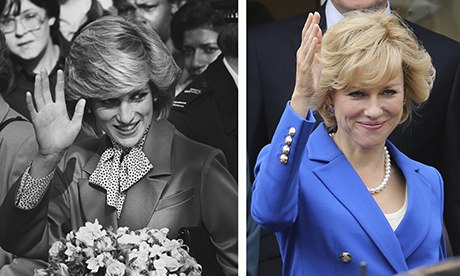
The Princess Diana biopic has bombed in the US, making only the equivalent of £40,000 from initial screenings in 38 cinemas in its first weekend. It is tempting to conclude that America has finally fallen out of love with Diana. But much more likely is that potential audiences were deterred by the panning the film has received on both sides of the Atlantic.
I kept away from the film when it was released in British cinemas for precisely the same reason: it sounded cringe-making. Yet even as I kept away, I was puzzled by the wall-to-wall contempt it had provoked. Yasmin Alibhai-Brown, writing in the Independent on Sunday, found the critical sniggering excessive too; was it, she asked, because some elements of the story, especially Diana's intimacy with a Pakistani doctor, were still unsettling?
Is it just the film of Diana that is embarrassing or the subject of Diana herself? Always an embarrassment to the royal family, she now seems at risk of become a best-forgotten embarrassment to the nation as a whole. The Mail recently ran a four-page 65th-birthday picture tribute to Prince Charles, celebrating him as a much-loved national treasure. Diana's presence in his life, at a period when he was very far from being much loved, was marked by a few small, easy-to-miss pictures.
Such airbrushing is evident on a public scale. Apart from the Diana memorial playground, there's no public commemoration of her: no statues, no dedicated buildings. Her charity, which attracted such a huge amount of money from the public, has been scaled down; her sons have carefully involved themselves in similar charities but kept away publicly from this one. There are no street names or pub signs, as popular public figures usually engender. It's not hard to imagine that in a few years she will be an entirely forgotten public figure.
One of the first things history students learn is how "history" is simply the documents and the version of events that have been preserved. They have to learn to look for gaps and silences as well as other evidence and versions of events alongside the received ones. The recent discovery of Richard III's body, and the historical discussion it provoked, was a reminder of how history comes to be rewritten by the winners. Was he a bad king or just a deposed king? Was the dominant history of his reign determined by Shakespeare's legitimising of the Tudors?
In the case of Diana, it is like being a living witness to this process of history being rewritten. A new narrative of the integration of an outsider into the royal family is being written around the figure of Kate, Duchess of Cambridge. But this time it's a successful one. In the aftermath of her death, Diana's emotional complexity was not only recognised but to some extent celebrated: she was seen as someone who had been treated badly by Charles and the royal family but who struggled to make something of her life. This included making some pretty unusual relationship choices given her background. But increasingly, in the context of Kate's rerun of the narrative, Diana's attempts at having a post–divorce life are seen as "flawed".
Kate is presented as doing everything right – bringing together a fractured family, opening up the royal family to a new social class (albeit a very privileged one) and, especially, appearing to give William what he wants. Diana's high-octane vulnerability by contrast can increasingly be presented not as charisma but as instability: it was her flawed personality rather than her treatment that caused the tragedy.
Interestingly, it is the concept of "embarrassment", so much in evidence around the Diana film, which seems to be the emotional mechanism by which Diana's existence is fading from view. Her choice of men, from lovers to butlers, is presented as embarrassing. The extraordinary grief that followed her death is increasingly presented as the nation's mawkish moment, implying that we were caught up in mass hysteria that should now embarrass us. Good grief, now she even has embarrassingly bad films made about her.
But if mass hysteria can be presented as the effect of manipulation, so too can mass embarrassment. The last years of Diana's life were a period when the darker sides of monarchy and patriarchal marriage were exposed to view. Embarrassment may be the way we are being persuaded not to remember.

